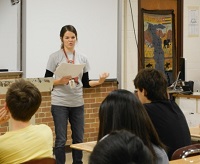Alyssa Ericson
Alyssa Ericson '13 is a teacher in Colorado.

What has been your vocational path since graduation? How did you end up where you are and what was the process of getting there? Is this what you expected to be doing?
I'm currently working as a US History, Government, and Economics teacher at an inner-city school in Colorado Springs. While I've always loved history, when I began at Wheaton I didn't envision myself as a teacher. I was hesitant at first to pursue it as a career option because I didn't want to simply opt for what "everyone does" when they major in history. However, I really loved the history department at Wheaton and my professors opened my eyes to engaging ways of teaching history that I had never encountered before. I also took a class on teaching for social justice through the education department that made me realize I could take my love of historical people and stories and use it to give back to my community.
Can you share some ways that your history major has enriched your life?
Majoring in history taught me so many wonderful things that I think I will value to the day when I am old and crotchety! The professors at Wheaton taught me to use humility and grace when I deal with both the people of the past and the people of the present. While we may have the privilege of seeing into certain parts of a person's world, we can never know their whole story and so we need be humble and extend grace to others. As a history major I also learned for the first time to think critically, to read well, and to question an author's motivation, bias, and context. I learned how to write, how to find sources, and how to create a strong thesis and essay. Majoring in history not only prepared me for my field, but I believe it also gave me invaluable skills for my daily life.
In light of your own experiences, what advice would you give to undergraduates? Do you have any advice specifically on making the most of a degree in history?
I would give two pieces of advice to undergraduates at Wheaton:
1) Cherish your time at Wheaton by taking advantage of awesome classes and by getting to know your professors.
2) If you make the wise decision to major in history :), keep the long term in mind. It's a wonderful major that prepares you to be a critical thinker, but unless you choose to pursue it further through a Masters degree or PhD, or become a writer, it is not a complete field in itself. I would pause (before your senior year) to answer the question of how you will use your degree.
If you have gone on to graduate work, can you suggest some tangible connections between your history major and your graduate studies?
I am currently working on my Masters degree in education. As I said above, my background in history has helped me think critically, enabled me to feel competent as a reader and writer, and has taught me humility as I pursue my studies.